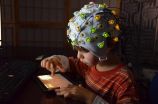INFORMATION:
Also working on this research were Wendy Middlemiss, associate professor of educational psychology at the University of North Texas and Erron L. Huey, assistant professor of family sciences at Texas Woman's University.
Helping parents understand infant sleep patterns
2014-12-19
(Press-News.org) Most parents are not surprised by the irregularity of a newborn infant's sleep patterns, but by six months or so many parents wonder if something is wrong with their baby or their sleeping arrangements if the baby is not sleeping through the night. Healthcare providers, specifically nurse practitioners, can help parents understand what "normal" sleep patterns are for their child, according to researchers.
"Nurse practitioners are at the frontline of healthcare," said Robin Yaure, senior instructor of human development and family studies, Penn State Mont Alto. "They are in an ideal position to help parents understand infant sleep pattern norms. Thus, nurse practitioners can help parents understand that 'sleeping through the night' is not entirely likely in young infants and that infants' sleep patterns change during the first few years of life."
According to the researchers, there are four common areas of concern for both parents and practitioners: what constitutes "normal" infant sleep and waking patterns, whether nightwakings are a problem or not, is a parent's presence disruptive when an infant is falling asleep, and whether sleep training is safe and healthy for infants. Sleep training is one way to establish a sleep routine for a child, although the methods used may not be appealing to parents or in the best interests of the child, the researchers said.
Yaure and colleagues reviewed current research on infant sleep, focusing on the above four areas of concern, and specifically infant safety and the well being of both infant and mother during nighttime care. The researchers suggest how to best integrate parents' preferences for care and best practice information, and include conversation points for nurse practitioners recently online in the Journal of the American Association of Nurse Practitioners.
Infants' sleep patterns vary for at least the first three years of life. There are many reasons for this, including changes in infant health and mobility and the development of separation anxiety.
"Sharing this basic information with parents is one way of assuring parents that infants' waking does not necessarily mean that the parents are doing something wrong," the researchers wrote.
Parent presence at bedtime, sleep training and infant self-settling are frequently debated topics about which parents might look to healthcare professionals for advice. Yaure and colleagues again point to sharing information with parents -- for example, recent research suggests that the presence of parents at bedtime, specifically during the transition to sleep, may not trigger nightwakings as previously thought.
The researchers also point out that recent research on the nonresponsiveness of mothers during nighttime care can raise stress for both mom and baby. Elevated stress increases cortisol in the body, which may hurt the baby in the long run. Increased cortisol levels are associated with depression, aggression and attention problems, among other issues, in children and adults.
"I worry about parents who feel like they can't trust their own instincts," said Yaure. "Different parents have different goals and ideas for parenting, and we want parents to figure out how to incorporate best practices into their belief system. We have to be culturally aware and sensitive to different families and beliefs."
By encouraging nurse practitioners to talk about current knowledge on infant nightwakings and parental presence, among other things, Yaure hopes that parents will become more comfortable and confident with their nighttime care choices.
Further research will include how doctors can also help translate research-based knowledge of infant sleep into practice.
ELSE PRESS RELEASES FROM THIS DATE:
High blood sugar in young children with type 1 diabetes linked to changes in brain growth
2014-12-19
Jacksonville, FL (December 19, 2014) - Investigators have found that young children with type 1 diabetes (T1D) have slower brain growth compared to children without diabetes. A new study, published in the December issue of Diabetes, now available ahead of print, suggests that continued exposure to hyperglycemia, or high blood sugars, may be detrimental to the developing brain. The research was supported by the National Institutes of Health (NIH).
"Our results show the potential vulnerability of young developing brains to abnormally elevated glucose levels, even when ...
Cells identified that enhance tumor growth and suppress anti-cancer immune attack
2014-12-19
(MEMPHIS, Tenn. - DECEMBER 18, 2014) A study led by St. Jude Children's Research Hospital scientists has identified the population of white blood cells that tumors use to enhance growth and suppress the disease-fighting immune system. The results, which appear in the December 18 edition of the scientific journal Immunity, mark a turning point in cancer immunology and provide the foundation for developing more effective immunotherapies.
For years, researchers have known that a diverse group of white blood cells called myeloid-derived suppressor cells (MDSC) are more abundant ...
AGU talk: Scaling climate change communication for behavior change
2014-12-19
In a previous randomized controlled trial, Stanford University researchers developed two curricula for Girl Scouts to use energy more efficiently: one on energy use at home, and the other in transportation and food. Both courses were effective for girls in the short term, and the home energy course was effective for girls in the long term and for parents in the short term.
Subsequently, the Northern California Girl Scouts began disseminating the programs via manuals and reusable materials, but that method of disseminating the programs has not lead to widespread use.
On ...
Parents' BMI decreases with child involved in school-based, community obesity intervention
2014-12-19
[Boston, MA December18, 2014] Parents of children involved in an elementary school-based community intervention to prevent obesity appear to share in its health benefits. A new analysis of Shape Up Somerville: Eat Smart Play Hard™ shows an association between being exposed to the intervention as a parent and a modest decrease in body mass index (BMI) compared to parents in two similar control communities. The study led by researchers at the Friedman School of Nutrition Science and Policy at Tufts University and the Centers for Disease Control and Prevention (CDC) ...
Neuroscientists identify brain mechanisms that predict generosity in children
2014-12-19
University of Chicago developmental neuroscientists have found specific brain markers that predict generosity in children. Those neural markers appear to be linked to both social and moral evaluation processes.
There are many sorts of prosocial behaviors. Although young children are natural helpers, their perspective on sharing resources tends to be selfish. Jean Decety, the Irving B. Harris Professor of Psychology and Psychiatry, and Jason Cowell, a postdoctoral scholar in Decety's Child NeuroSuite lab, wanted to find out how young children's brains evaluate whether ...
Oil palm -- a modeled crop
2014-12-19
Australian scientists have developed a model for oil palm cultivation, aimed at helping growers of the crop maximize the yields of their plantations, while minimizing detrimental environmental impacts.
The model was recently published in the journal Environmental Modeling & Software.
"Oil palm has become a major crop in the tropics, cultivated on more than 39 million acres of land," co-author Dr Paul Nelson of James Cook University (JCU) said.
"Demand for the product continues to grow, and the industry is expected to keep expanding in the foreseeable future.
"At ...
A*STAR scientists discover gene critical for proper brain development
2014-12-19
Scientists at A*STAR's Institute of Medical Biology (IMB) and Institute of Molecular and Cellular Biology (IMCB) have identified a genetic pathway that accounts for the extraordinary size of the human brain. The team led by Dr Bruno Reversade from A*STAR in Singapore, together with collaborators from Harvard Medical School, have identified a gene, KATNB1, as an essential component in a genetic pathway responsible for central nervous system development in humans and other animals.
By sequencing the genome of individuals of normal height but with a very small head size, ...
Quantum physics just got less complicated
2014-12-19
Here's a nice surprise: quantum physics is less complicated than we thought. An international team of researchers has proved that two peculiar features of the quantum world previously considered distinct are different manifestations of the same thing. The result is published 19 December in Nature Communications.
Patrick Coles, Jedrzej Kaniewski, and Stephanie Wehner made the breakthrough while at the Centre for Quantum Technologies at the National University of Singapore. They found that 'wave-particle duality' is simply the quantum 'uncertainty principle' in disguise, ...
OCD patients' brains light up to reveal how compulsive habits develop
2014-12-19
Misfiring of the brain's control system might underpin compulsions in obsessive-compulsive disorder (OCD), according to researchers at the University of Cambridge, writing in the American Journal of Psychiatry.
The research, led by Dr Claire Gillan and Professor Trevor Robbins (Department of Psychology) is the latest in a series of studies from the Cambridge Behavioural and Clinical Neuroscience Institute investigating the possibility that compulsions in OCD are products of an overactive habit-system. This line of work has shifted opinion away from thinking of OCD as ...
Tooth loss linked to slowing mind and body
2014-12-19
The memory and walking speeds of adults who have lost all of their teeth decline more rapidly than in those who still have some of their own teeth, finds new UCL research.
The study, published in the Journal of the American Geriatrics Society, looked at 3,166 adults aged 60 or over from the English Longitudinal Study of Ageing (ELSA) and compared their performance in tests of memory and walking speed. The results showed that the people with none of their own teeth performed approximately 10% worse in both memory and walking speed tests than the people with teeth.
The ...


